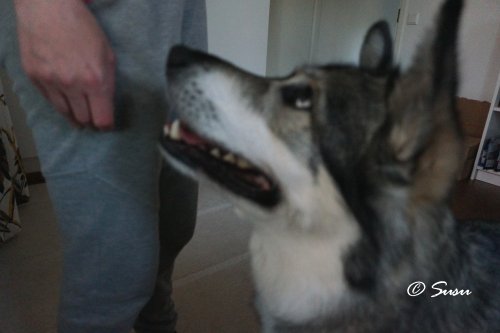In this post I point out different reasons why a dog might not be food motivated and some ideas how to improve that.
When I show my website to people and show them how Miki is always working with his food puzzles, they often pin point that Miki is truly food motivated and he’s willing to work for his food, to say at least. They have told me that their dogs aren’t food motivated at all and this can be true, but only up to a point.
We humans see our dogs’ motivation to food differently. If we think closely, the truth is that every dog needs to eat in order to stay alive. So the quick conclusion is that all healthy dogs are food motivated because they have to eat.
Some dogs fast every now and then but not their whole live. If your dog doesn’t seem to have an appetite it may be wise to pay a visit to your vet to exclude any possible illnesses. Especially if your dog’s appetite has decreased all of a sudden and you haven’t changed his diet. If your dog is healthy and still won’t eat then this article is just for you.
Is your dog hungry?
Imagine yourself in your favourite restaurant. You’ve just had a three course meal with desserts and all and you feel absolutely full. If someone was offering you a full plate of mac ‘n’ cheese at this point, would you eat it? How about if that person was asking you to work for this plate of food by doing the dishes of your whole party? I’ll bet you wouldn’t want it.
If your dog isn’t hungry, he probably doesn’t want to eat. He might be willing to have a taste but that’s all.
You should always train your dog only when he’s hungry and that is most likely after he had his walk and before his dinner. If your dog is really truly hungry he is willing to do what you ask, because then he gets the thing from you that he needs the most at that moment - food.
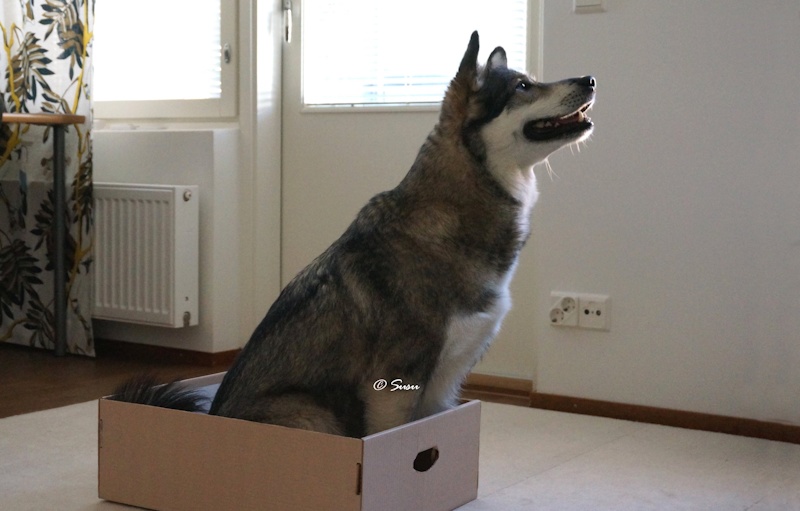
You shouldn’t train your dog right after he had his meal. When your dog is full and tired you will then only teach him that you never offer him the things he need so why bother.
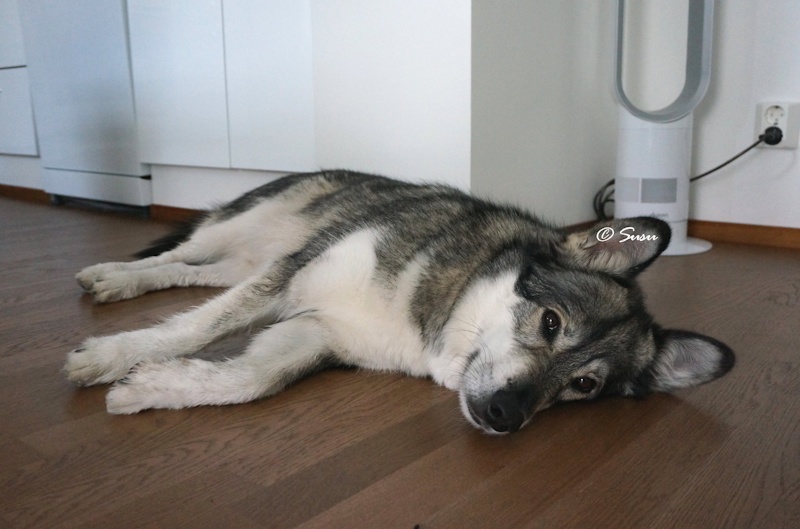
Food motivation after all?
We dog owners tend to have troubles saying no to our furry friends. Many of us, without thinking of it, give treats and leftovers from our own plate, especially when our dog is begging and drooling next to us. If your dog begs for samples and leftovers, he is food motivated. Although it may seem to you just the opposite when your dog won’t eat his kibble from his bowl.
Begging is motivation and therefore you should consider the possibility that a) your dog’s poor appetite is due to the amount of snacks and treats you give him b) the quality of the dog food he’s provided isn’t as good as it should be.
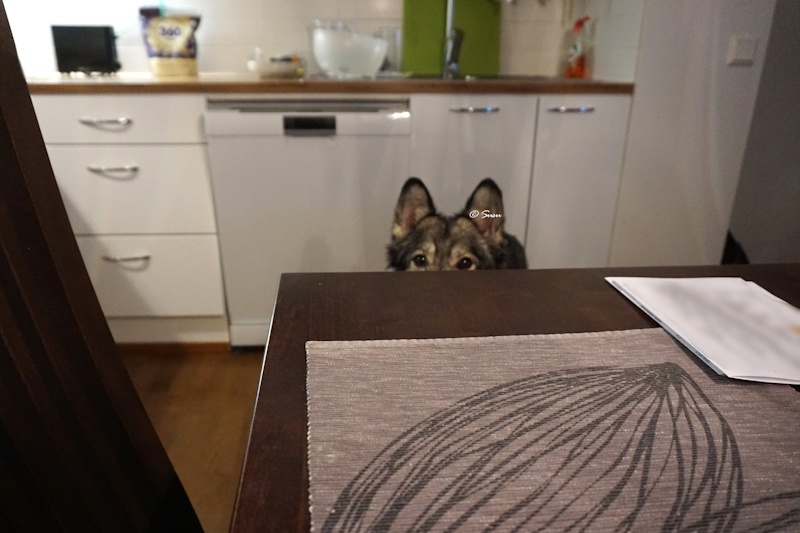
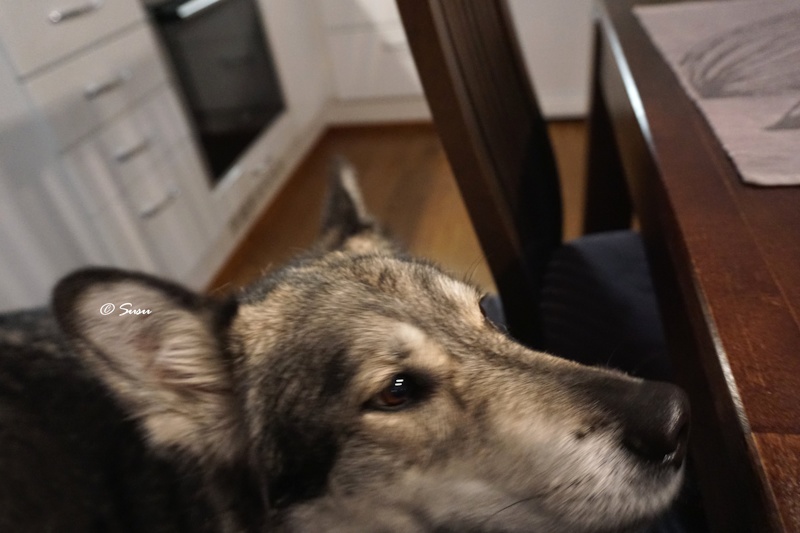
Ooh what’s that you got there?
What dog food is made of?
At this point we should stop and think what we are actually feeding to our dogs. Regular cheap dog food often contains wheat, corn and potatoes because manufacturers try to make the food with as low cost as possible. Wheat, corn and potatoes are cheap fillers, but they don’t have any nutritional value for dogs what so ever.
Dog food should mainly consist of animal proteins and vegetables, but small amounts of rice and oats are acceptable. If you look at the ingredients list on the food package, the first four ingredients should always be animal proteins like meat, chicken, fish or eggs. If at least four first ingredients are meat/chicken/fish/eggs you can be quite sure that the quality of the food is good enough.
It’s the same thing with dog treats. Those small and soft bones that are so convenient when you train your dog consists mainly of wheat/corn/rice (can be up to 80-90% grains) although they can advertise the products with “chicken or beef flavour”. So you should look at the ingredients when you buy treats for your dog. When you teach a completely new thing to your dog you should reward him with real meat, like boiled chicken or some cheese. When the reward is worth pursuing, the dog is more cooperative and looks forward to those training sessions with you.
When Miki was a puppy we fed him the food his breeder had selected, which was Nutra Nuggets dry kibble. Miki was born hungry but he didn’t eat this food. I looked at the ingredients list, and it begins like this: Chicken meal, corn… so the product contains a high percentage of corn, although the manufacturer advertises this food as premium. After we changed this food to other brand (Orijen) there hasn’t been a single time that Miki haven’t eaten every single kibble provided to him. At the time I’m writing this, Miki has been fed Orijen for almost four years continuously and he’s ever so eager and grateful when he gets to have it.
I really do appreciate if you go and pick up your dog’s food package and check out the ingredients.
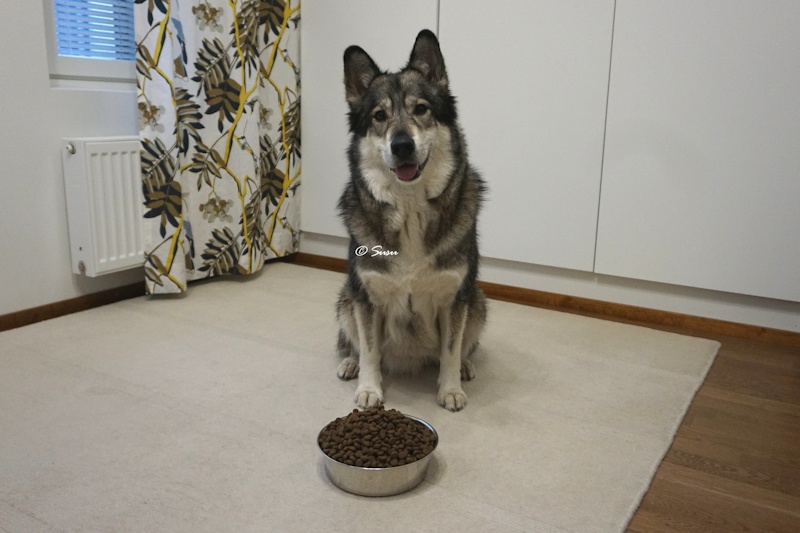
Don’t worry, Miki didn’t get to eat all this food at once, although he surely would’ve finished it if he were given the choice.
Increase the value of food - nothing comes for free
It’s good to teach your puppy from the very beginning that nothing comes for free. You can implement this with an older dog as well but the adjustment might take some time.
Imagine that you’ve just hit the jackpot on the lottery. You don’t ever need to work again and you can fill your refrigerator as you please. Or you can eat at the best restaurants for the rest of your life if you want to. You are now all dressed up and on your way to your favourite restaurant. Then someone on the street offers you a bowl of soup for three hours of manual labour. What are the odds that you would rather go and do manual labour in your fancy clothes?
Then imagine this. You have lived your whole life hand to mouth and you never know when the next meal is coming or will you be forced once again to go to bed hungry. Now, if someone offers you that same deal, a warm bowl of food for a few hours of work I’ll bet that now the work seems rather good option.
So if your dog has a free 24 hour buffet (there is always food in his bowl) the likelihood is that your dog is not motivated to work for it, because he has free access to it.
You can change this quite easily. Give your dog a normal amount of food and let him eat as much as he eats at one go (max 15 minutes). If your dog stops to eat when there is still food left in his bowl, take the bowl away. At next mealtime give your a normal amount of food despite that he didn’t finish up last time. This way he learns quickly that if he doesn’t eat what’s given to him it will be taken away. This way the value of the food increases in your dog’s mind and in the future he will probably eat whatever you give him. Miki values his food so much that you could feed him rocks (not that I would) and he would still lick his bowl clean.
If your dog haven’t touch his regular food at all and then you have felt sorry for him and gave him your leftover dinner from the fridge, you may not even realize it but you have actually taught him that by not eating you always get something better. (And the better food doesn’t necessarily mean better taste or nutritional value, but the value your dog has given particular foods, that you store beyond reach.)
When you are about to give food/treats/toy to you dog, always ask him to perform something before you give the food/toy to him. Simply ask your dog to sit/lay down/shake hands/whatever. If he doesn’t do what you ask him to do then just put the food/toy back where you took it in the first place and leave your dog wondering what just happened. Watch tv/surf on the Internet/do something else for about 5-15 minutes and then ask your dog to do the same thing you asked before. This time he’ll most likely obey if the reward is good enough. You should only ask your dog to do something that he really knows well. When you always ask your dog to do something before he gets anything and your dog then puts on an effort to get it, he’ll see the rewards in a different light and appreciates them more.
Miki already knows how this works and every time he’s about to have his meal or treat he offers me a sit or a lay down depending on the situation, without asking :) You can decide yourself would you rather have your dog sitting and waiting every time or would you rather ask him a different behaviour each time.
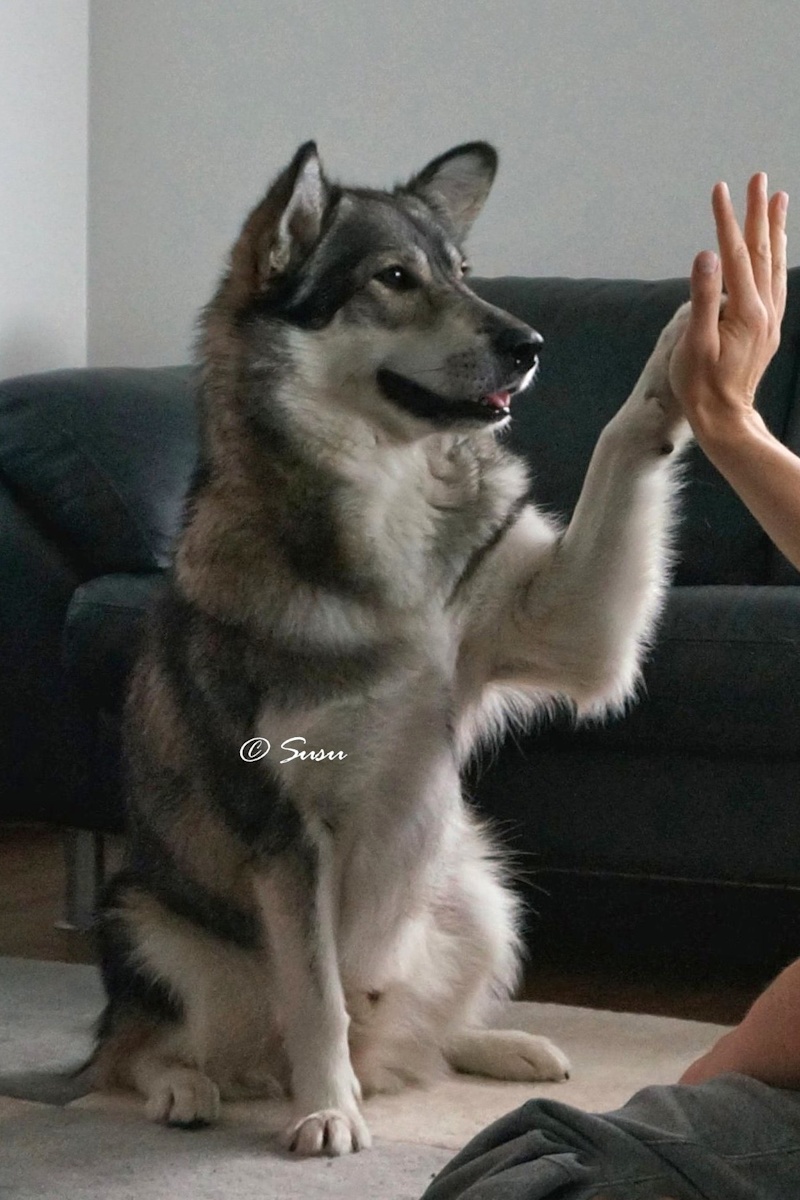
If your dog is given everything from a silver platter, he probably won’t appreciate anything you give him. When a dog needs to work for his food, the value of the food increases immediately. What would you consider to be more valuable, a sweater that you have knit yourself or another sweater that you have bought from a sale for ten dollars? I’ll bet you would choose the one you have made yourself, because you have put so much time and effort into it.
Test your dog and find out what motivates him the most
The fact is that every dog needs to eat in order to stay alive. All dogs aren’t equally food motivated and that varies between different breeds. From the training point of view the most important thing to do is to find the thing that your dog finds most motivating. One dog sees food as the only option, other prefers playing, third might want only attention and belly scratches, fourth might settle with praise only and fifth might be motivated with all of these or something completely different :)
If you aren’t sure what motivates your dog the most, you can do this simple test. You probably know the expression on your dog when he’s clearly waiting for something. When Miki does something that I asked him to do and I pay him with praise and/or petting only he always gives me this waiting expression because he is waiting something (=a food reward). His whole being is shouting “Hello, I did something that I expect to get paid” and he looks my eyes and my hand in turns waiting that I put my hand in my pocket and pay him with food. Or sometimes he gives me this long face if he’s disappointed when there is no food reward.
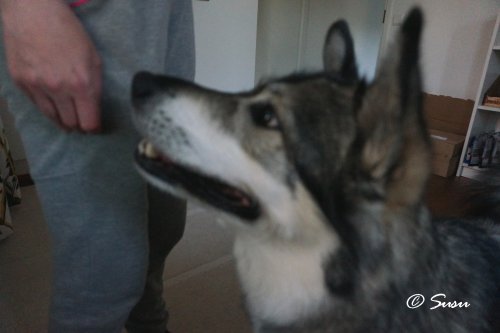
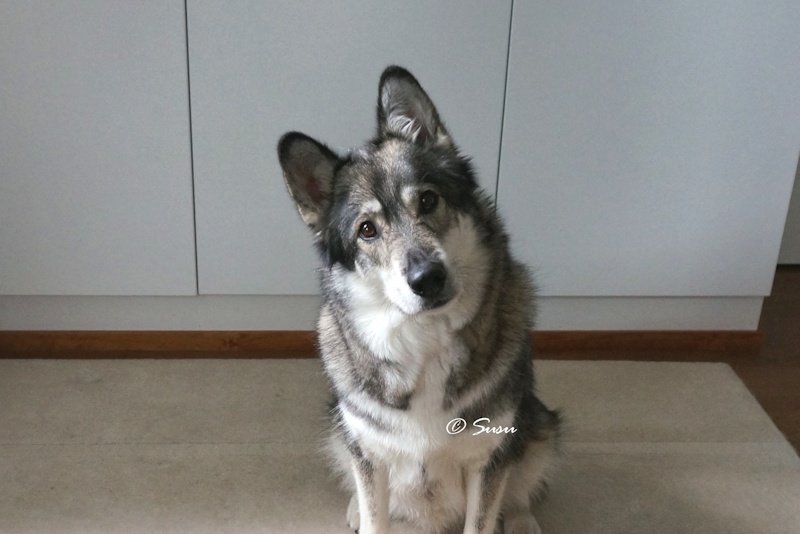
I’m disappointed! Where’s my reward?
So, ask your dog to do something that he knows for sure and praise him. If he looks at you like he is waiting for something you can be sure he really is. After that you can try rewarding him with petting/scratching and after that with a toy or a play session. If he still continues to look at you in that waiting mode you can try different food rewards or completely something else. Many dogs can also be rewarded with the free cue - like Miki is - when you give him a permission to go play/sniff/write pee-mail/or whatever.
Sometimes Miki is quite funny when I’m testing him with different rewards. You can see from a mile away as he’s thinking that “go on and scratch/pet me already so we can get to the food” :D
There are some situations when Miki accepts attention and petting as a reward, like when I come home from work. I have taught him to greed me calmly and for reward he gets lots of attention. Miki hasn’t ever seen verbal praise as a reward. Verbal praise to him is only a mark that he did a right thing and then expects another reward for it. You can’t get Miki to do much for a verbal praise or a toy reward but he sure is ready walk around the world for a single piece of dry kibble.
The most important thing is to find a thing or two that motivates your dog the most. It can be food, toys or almost anything else. It’s also very important to make sure that your dog is provided with tasty and nutritious food. Such food that your dog is willing to work for.
2017-03-15
